Obsessive-compulsive disorder can be a debilitating mental illness that significantly impacts an individual’s quality of life. ERP-OCD is one of the most effective treatments for OCD, but it can be difficult to find a therapist who specializes in this type of therapy. In this blog post, we will discuss everything you need to know about ERP-OCD and how to get started on your road to recovery.
Contents
Understanding ERP For OCD
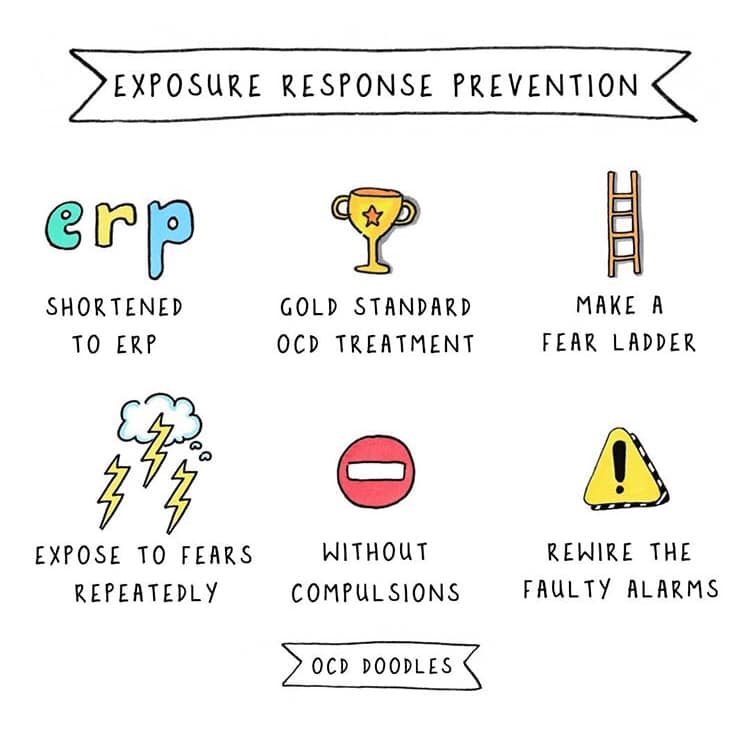
ERP-OCD, or exposure and response prevention for OCD, is a type of cognitive-behavioral therapy that focuses on helping individuals learn to control their obsessive thoughts and compulsive behaviors.
This therapy is based on the principle that by exposing oneself to the things they are afraid of and then refraining from performing their compulsions, they will eventually learn to control their OCD.
Theory Behind ERP-OCD
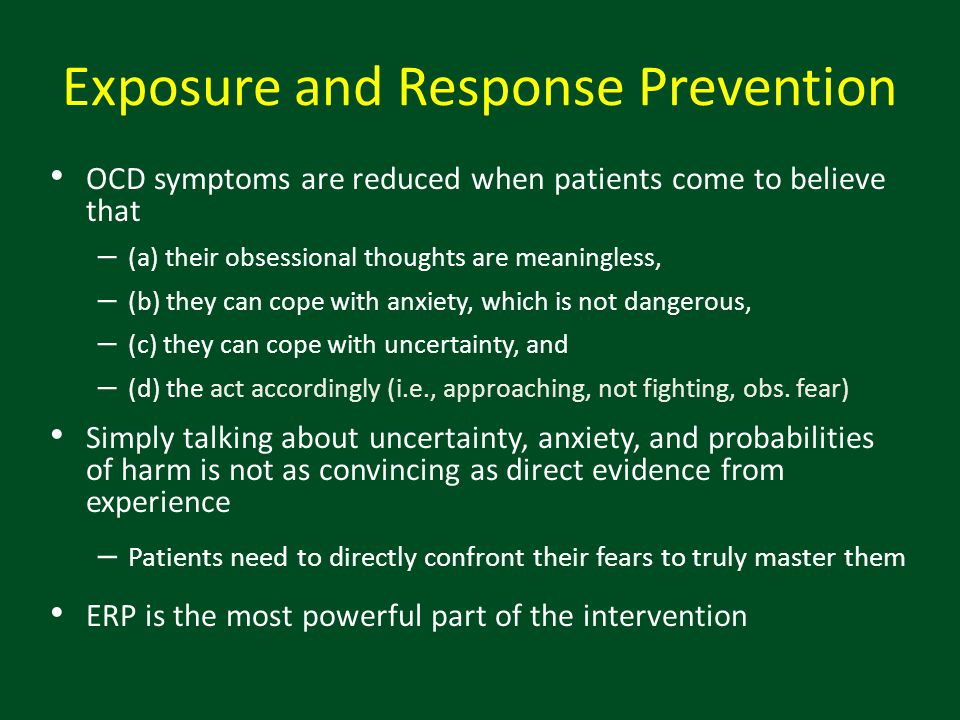
ERP-OCD involves gradually exposing the patient to the things they are afraid of, starting with the least feared objects or situations and working up to the most feared. The therapist will work with the patient to develop a hierarchy of fear objects or situations, starting with those that cause the least amount of anxiety and progressing to those that cause the most anxiety. The therapist will then help the patient expose themselves to their fear objects or situations starting with the least feared and working up to the most feared.
OCD-ERP Exercises
Many different exercises can be used in ERP-OCD, but they all have one goal: to help the patient learn to control their OCD.
Some of the most common exercises include:
- In vivo exposure, involves exposing the patient to real-life objects or situations that they are afraid of, and
- Virtual reality exposure uses computer-generated images to expose the patient to their feared objects or situations.
- Imaginal exposure involves the patient imagining the feared object or situation while refraining from performing their compulsion.
How To Practice Imaginal Exposure
For example, if a patient is afraid of contamination, they may imagine touching a doorknob that has been contaminated with bacteria.
As the patient imagines the feared object or situation, they will likely experience anxiety. The therapist will help the patient stay in the anxiety-provoking situation until their anxiety starts to decrease.
This exposure exercise is usually done for a period of 30 minutes to an hour, and it is often repeated daily until the patient’s anxiety starts to decrease.
Strategies Taught Under ERP-OCD
During ERP-OCD, therapists teach patients a variety of strategies to help them cope with their anxiety and manage their compulsions. Some of these strategies include:
- deep breathing,
- thought stopping,
- muscle relaxation, and
- visualization.
Patients are also taught how to identify and challenge the negative thoughts that contribute to their OCD.
NOTE: Thought-stopping exercise involves the patient learning to stop their OCD thoughts by saying a certain word or phrase to themselves.
Is It Accompanied By Medication
ERP-OCD is usually accompanied by medication, such as antidepressants or anti-anxiety medication. This is because the Exposure and Response Prevention component of ERP-OCD can be very anxiety-provoking, and medication can help to reduce this anxiety.
ERP Treatment Outpatient Vs. Inpatient
ERP-OCD treatment can be provided on an outpatient basis. It means that patients will not have to stay in a hospital or treatment center overnight.
However, some patients may require inpatient treatment, which means they will stay in a hospital or treatment center for some time.
NOTE: Some patients may require a combination of outpatient and inpatient treatment.
Evaluating ERP For OCD
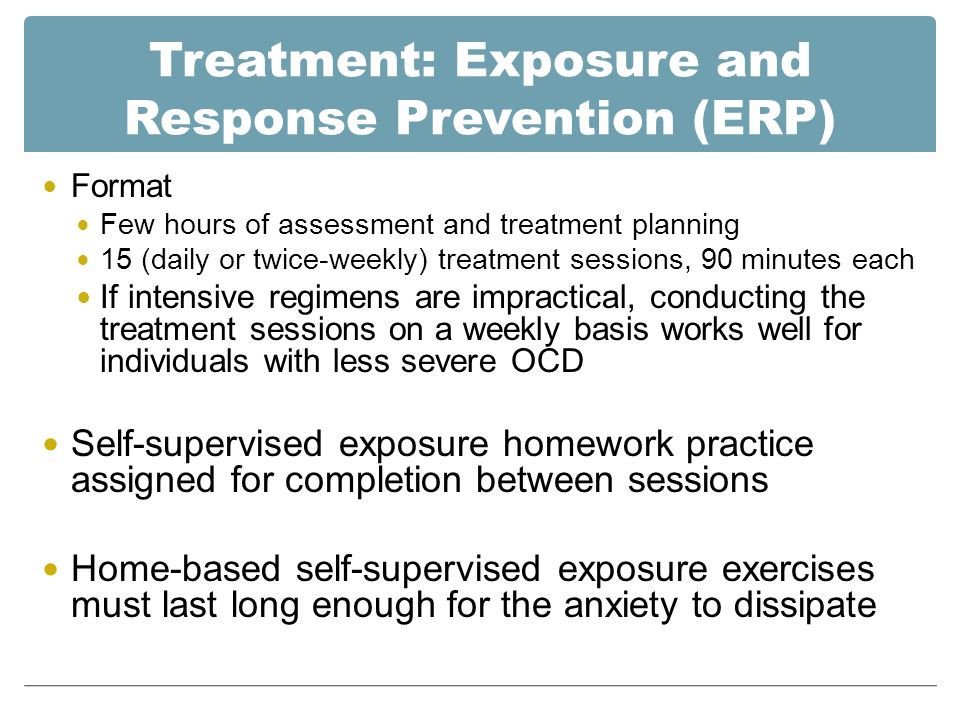
ERP-OCD is an effective treatment for OCD, with most patients seeing a significant reduction in their symptoms. However, it is important to note that ERP-OCD is not a cure for OCD, and some patients may experience a relapse of their symptoms after completing treatment.
Benefits of ERP For OCD Recovery
ERP-OCD has several benefits for those suffering from OCD. This type of therapy can help to reduce the intensity and frequency of obsessions and compulsions, as well as improve an individual’s quality of life. In addition, ERP-OCD can help patients learn how to control their OCD and prevent it from interfering with their daily lives.
Biological Effects of ERP-OCD
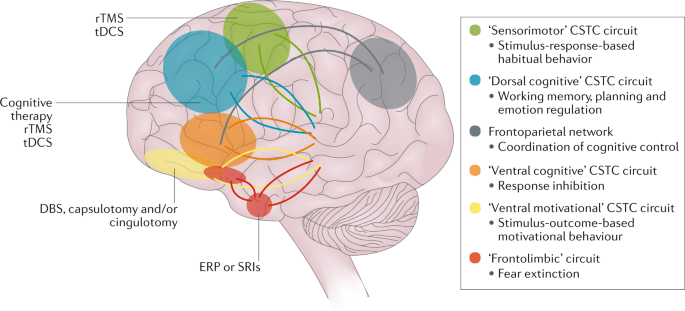
ERP-OCD has been found to have several biological effects, such as reducing the activity of the amygdala, which is responsible for fear and anxiety. In addition, ERP-OCD has been found to increase levels of serotonin, which is a neurotransmitter that helps to regulate mood.
Limitations And Criticisms
ERP-OCD is not without its limitations and criticisms. Some patients may find the exposure component of ERP-OCD to be too anxiety-provoking, and as a result, may drop out of treatment. In addition, some people may criticize ERP-OCD for its lack of a cure.
Why Consider It
Despite its limitations, ERP-OCD is an effective treatment for OCD that can help patients to reduce their symptoms and improve their quality of life. If you or someone you know is struggling with OCD, consider seeking out a therapist who specializes in ERP-OCD.
Finding ERP Therapist For OCD

If you are interested in finding a therapist who specializes in ERP-OCD, there are a few things you can do. For instance, you can:
- Ask your doctor for a referral, or
- Search the internet for therapists who specialize in ERP-OCD.
- Contact your local mental health association or OCD foundation for a list of therapists who specialize in ERP-OCD.
How To Get Started
If you are ready to get started with ERP-OCD, the first step is to find a therapist who specializes in this type of therapy. Once you have found a therapist, you will meet with them for an initial assessment. During this assessment, the therapist will gather information about your OCD and develop a treatment plan.
What To Look Out For
When searching for a therapist, there are a few things you should look out for.
- First, make sure the therapist is qualified and experienced in treating OCD with ERP-OCD.
- Second, make sure the therapist is someone you feel comfortable with and can trust.
- Finally, make sure the therapist is willing to work with you to develop a treatment plan that is tailored to your specific needs.
Red Flags To Avoid
When searching for a therapist, there are a few red flags you should be aware of.
- First, avoid therapists who promise to cure your OCD.
- Second, avoid therapists who tell you that you need to take the medication to treat your OCD.
- Third, avoid therapists who try to sell you a product or service.
Important Client Characteristics
There are a few important client characteristics that are necessary for the success of treatment.
- First, the client must be willing to participate in exposure and response prevention exercises.
- Second, the client must be able to tolerate anxiety and discomfort during these exercises.
- Third, the client must be committed to completing treatment.
Listing Alternative Therapies For OCD
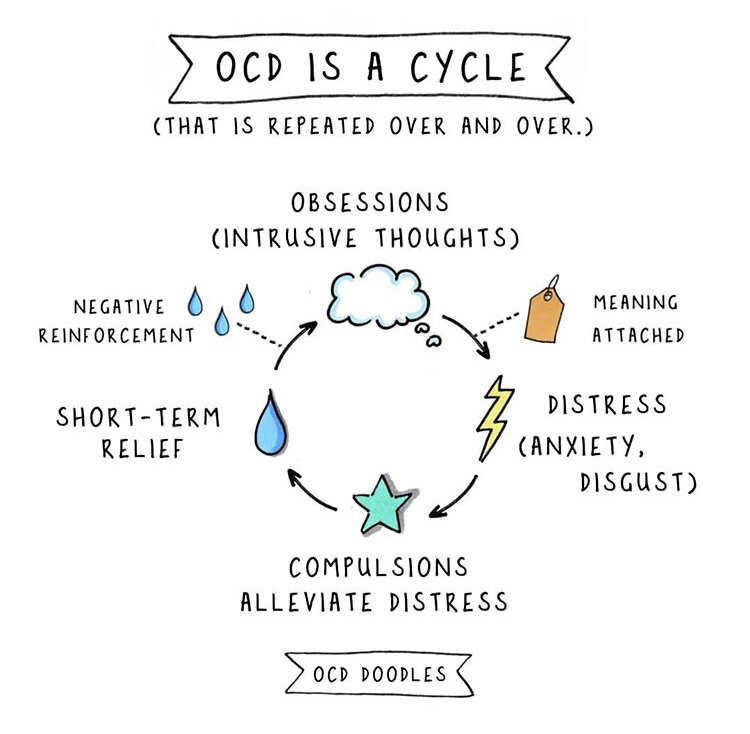
There are several alternative therapies for OCD, such as:
- Yoga: This is a type of therapy that focuses on physical and mental relaxation.
- Meditation: This is a type of therapy that focuses on mindfulness and breathing.
- Biofeedback: This is a type of therapy that uses devices to help you to control your body’s response to stress.
- Habit Reversal Training (HRT): This is a type of therapy that focuses on changing your OCD-related behaviors.
- Cognitive-behavioral therapy (CBT): This is a type of therapy that focuses on changing negative thoughts and behaviors.
- Dialectical behavioral therapy (DBT): This is a type of therapy that focuses on helping you to manage your emotions.
- Psychodynamic therapy: This is a type of therapy that focuses on exploring the unconscious mind.
- Acceptance and commitment therapy (ACT): This is a type of therapy that helps you to accept your thoughts and feelings, without trying to change them.
- Medication: Several different types of medication can be used to treat OCD, such as antidepressants, anti-anxiety medications, and antipsychotics.
Which Is The Effective Therapy For Treating OCD
While there are many alternative therapies for OCD, not all of them are backed by scientific evidence. However, some alternative therapies, such as CBT and ERP, are effective in treating OCD.
However, different people will respond to different therapies in different ways. You may need to try several different types of therapy before you find one that works for you.
It is important to work with a therapist who is experienced in treating OCD, and who can tailor the therapy to your specific needs. More importantly, it is important to find a mental health professional that’s right for you.
How OCD Mantra Can Help You

OCD Mantra is an evidence-based mental health app that offers a range of tools and resources to help you manage your OCD. If you’re looking for an alternative therapy for OCD, Mantra Care can help.
We help you find the right therapist for your needs. We will work with you to create a custom treatment plan that fits your needs and goals. Contact us today to learn more about how we can help you recover from OCD. With Mantra Care, you can:
- Learn about different types of OCD and their symptoms
- Understand how OCD is treated with ERP
- Practice ERP with the help of a virtual coach
- Track your progress and set goals
- Connect with a community of other people who have OCD
If you’re interested in learning more about how Mantra Care can help you, visit our website or download the app today.
Conclusion
ERP-OCD is an effective treatment for OCD that can help patients to reduce their symptoms and improve their quality of life. So, if you or someone you know is struggling with OCD, consider seeking out a therapist who specializes in ERP-OCD.
If you are looking for affordable Online OCD Counseling MantraCare can help: Book a trial OCD therapy session


